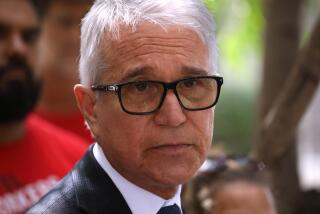Op-Ed: Here’s how to rescue local elections from obscurity with one simple change
In April 2013, when Eric Garcetti was elected mayor of Los Angeles — a city of 4 million people — he received 233,000 votes. That was the lowest total vote count for a winning mayoral candidate since 1933.
Low voter turnout is a significant problem around California, but no place more so than Los Angeles County. Most cities here — 78 out of 88 — hold municipal elections off-cycle, in odd-numbered years, which is what Los Angeles City traditionally did. However, L.A. is shifting its voting in 2018 to align with state and national elections, in even numbered years. Other cities in the county should do the same.
------------
FOR THE RECORD
A March 28 op-ed incorrectly stated that the 233,000 votes for Eric Garcetti in 2013 were the fewest garnered by a winning candidate for mayor of Los Angeles since 1933. That is true only for non-incumbent candidates. Other mayors, including Antonio Villaraigosa in 2009, were re-elected with fewer votes.
------------
The recent history of local elections in Los Angeles County is filled with cautionary tales of low turnout. The most egregious is surely the City of Bell’s 2005 special election to become a charter city. In that city of 35,000 people, the consequential measure passed by a vote of 336-54, opening the door to $100,000 salaries for part-time councilmembers and a notorious corruption scandal.
Elections that coincided with a presidential vote attracted a 40% turnout, compared with only 17% for those held in odd years.
Changing election timing has an undeniable effect on turnout. Recently, we analyzed more than 1,000 California mayoral elections between 1995 and 2014. We found that elections that coincided with a presidential vote attracted a 40% turnout, compared with only 17% for those held in odd years.
In 16 cities where election timing was changed from odd to even years, turnout went up by 15 points, from 21.4% to 36.3%.
The idea of off-cycle municipal elections originated during the late 1800s and early 1900s. Progressive Era reformers believed separating local politics from state and national elections would benefit democracy and undermine powerful party machines (and, not coincidentally, help those very same reformers win office).
Today, however, it’s clear that off-cycle elections are actually suppressing participation in local elections. It’s not hard to understand why. A lack of media and party attention to local races makes it harder to learn about candidates, issues, voting hours or locations.
In particular, without state offices or a presidential contest at stake, the incentive to make it to the polls falls off — especially if voters have to take time off from work to cast their ballots.
California lawmakers recently adopted SB 415, which requires cities and other political subdivisions like school districts with especially low voter turnout to tie their contests to state elections. The threshold is 25% below the city’s average turnout in the last four statewide general elections.
In pushing the measure, state Sen. Ben Hueso argued that low turnout in local elections results in political bodies that don’t resemble their communities. Holding elections concurrently with statewide races, he argued, would boost turnout, reduce “voter fatigue” and build a habit of participating in local elections. The law takes effect in 2018.
But cities shouldn’t wait for their turnouts to get so low that SB 415 triggers a mandatory change. City leaders can take the initiative, as happened in Los Angeles in 2015, and propose amending their city election rules immediately.
Lawmakers often talk about the need to increase voter participation and civic engagement. If they are serious about improving the situation, there is an easy fix: hold municipal elections so they coincide with midterm or, better yet, presidential elections. And if politicians don’t act, good-government groups might want to apply pressure just as they did in the Progressive Era.
Melissa Marschall is a political science professor at Rice University and director of the Kinder Institute for Urban Research’s Center for Local Elections in American Politics. John Lappie is a post-doctoral fellow at the Center for Local Elections in American Politics.
Follow the Opinion section on Twitter @latimesopinion and Facebook
More to Read
A cure for the common opinion
Get thought-provoking perspectives with our weekly newsletter.
You may occasionally receive promotional content from the Los Angeles Times.










